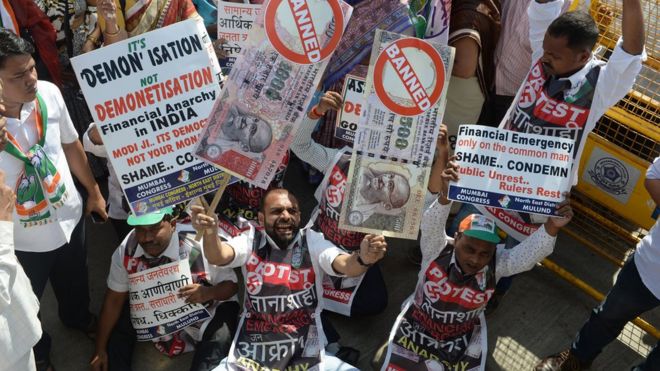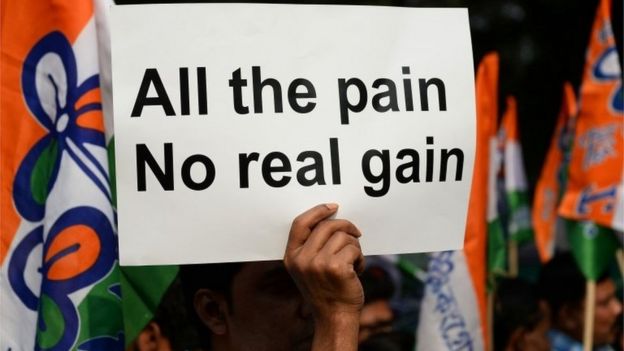on Wednesday. The Congress party demanded an apology from Prime Minister Narendra Modi, who had promised a "surgical strike" on so-called black money.
It said India's credibility abroad had been "dented". The government hit back, predicting boosted tax revenues.
The row came after the annual Reserve Bank of India (RBI) report showed that despite last year's surprise ban on high-currency notes, a total of 15.28tn rupees ($242bn) - or 99% - of the money had made its way back into the banking system.
Ministers had hoped "demonetisation" would make it difficult for hoarders of undeclared wealth to exchange it for legal tender.
But former Congress finance minister P Chidambaram said that the policy had "not only dented the institutional sanctity of RBI, but also credibility of India abroad. The PM should apologise to the nation."
Congress vice president Rahul Gandhi tweeted that the policy had been a "colossal disaster" that had "ruined" the economy.
Another opposition leader, Mamata Banerjee, who is the chief minister of West Bengal state, said the bank data pointed to a "big scam".
Current finance minister Arun Jaitley countered, saying the economy would benefit in the medium and long term.
"The fallout of demonetisation is on predicted lines... the fact that money got deposited in banks doesn't make it legitimate money," he said.
He added that many people had been brought under the tax net, partly as a result of the policy.
Queues for cash
The policy, announced on 8 November last year, brought chaotic scenes across India.
Banks ran out of cash after the ban on 500 ($7) and 1,000 rupee notes, which accounted for about 85% of the money in circulation.
At others, police were called in to manage long queues of anxious customers hoping to change their savings.
Many low-income Indians, traders and ordinary savers who rely on the cash economy were badly hit.
Why India wiped out 86% of its cash overnight
Currency move was 'bad economics'
Viewpoint: Currency gamble was a big mistake
By Vivek Kaul, Economic Analyst
Has demonetisation been a success or a failure? As per the RBI data, it's safe to say that demonetisation has been a failure of epic proportions.
The RBI report says that illegal notes worth 15.28tn rupees ($242bn) had been deposited in banks up to 30 June. This basically means that almost 99% of the "demonetised" money was deposited into banks and wasn't really destroyed.
As far as detecting counterfeit currency is concerned, nothing much seems to have happened on this front either.
Over and above this, the government's policy caused a huge cash shortage, with people having to spend many days standing in ATM lines trying to withdraw their own money.
As far as the Modi government is concerned they are unlikely to admit it was a big mistake and will continue to put a positive spin on it, as they have since last November. Things will not change on that front.
Read more: Why Modi's currency gamble was 'epic failure'
Politicians, analysts and ordinary Indians have argued for months over whether Prime Minister Narendra Modi's so-called demonetisation gamble was a success or failure.
Now the data finally provides the answer, on page 195 of the Reserve Bank of India (RBI) annual report.
Agriculture, the rural economy and property - which rely largely on cash transactions - were sectors hit by the ban.
It also contributed to a slowdown in economic growth.
India's cash crisis explained
'eDesperate housewives' scramble to change secret savings
But some analysts did point out the policy did have some positive aspects, including injecting cash into the banking system which had brought the cost of loans down.
"While this shows that demonetisation exercise has not yielded a large one-time gain, it has led to financialisation of dormant savings and helped bring down lending rates," one economist in Mumbai told Reuters.
Few observers think the bank figures will damage the government, which has fended off criticism of its cash crackdown while making electoral gains, including a sweeping victory in crucial Uttar Pradesh state in March.






No comments: